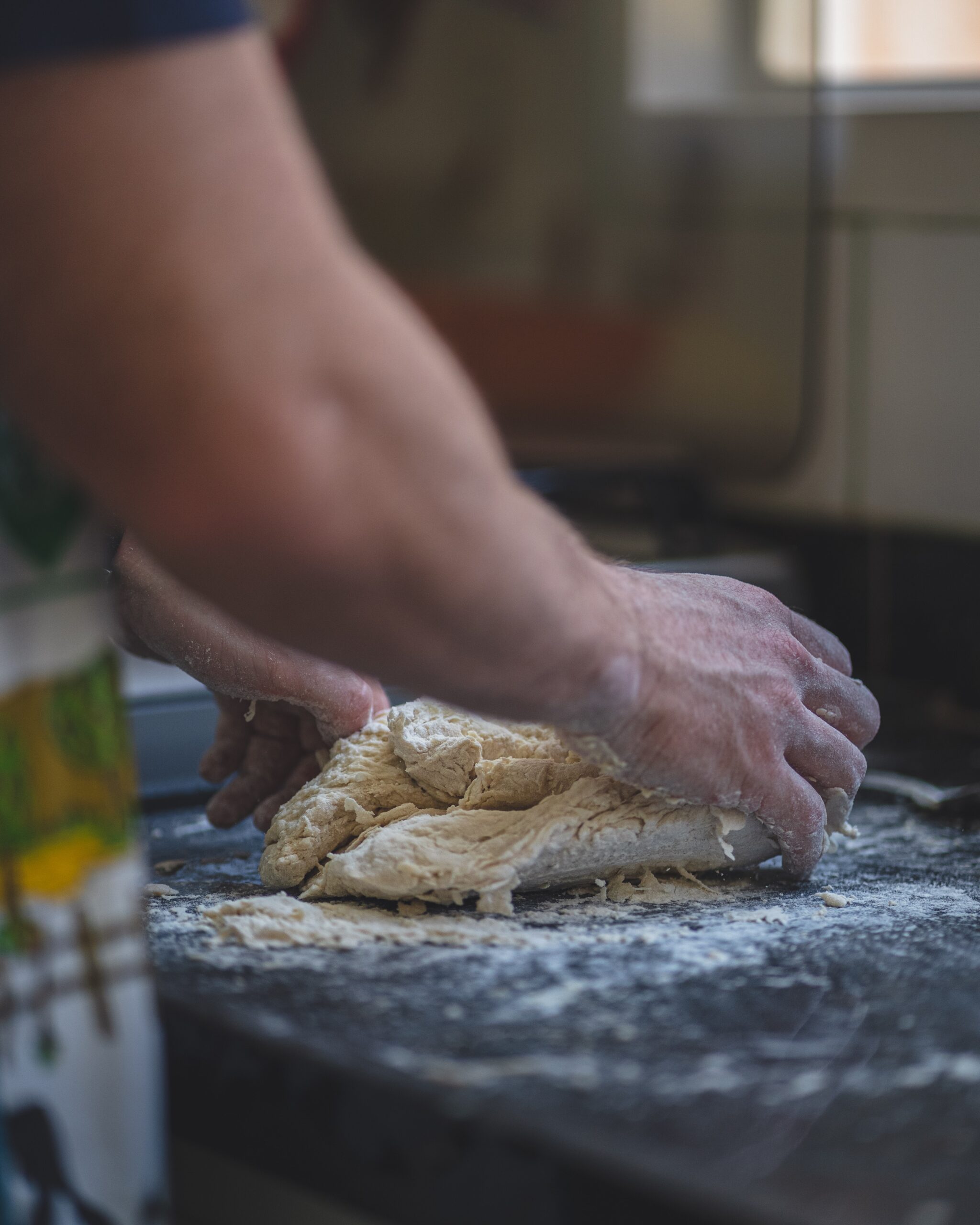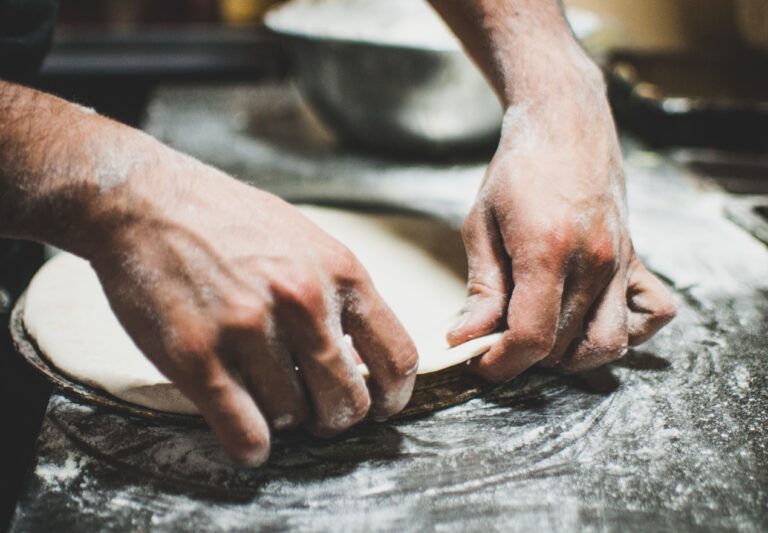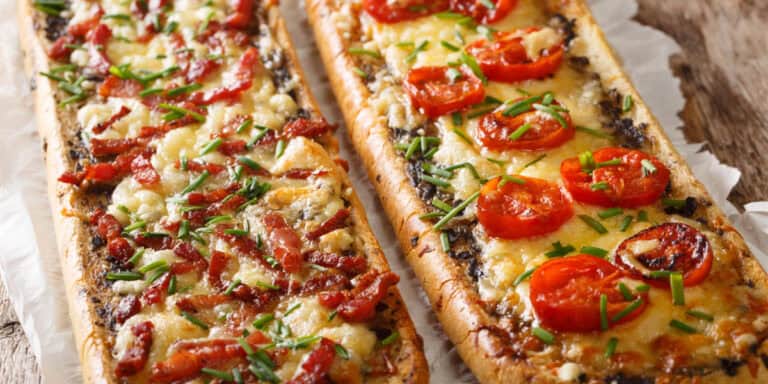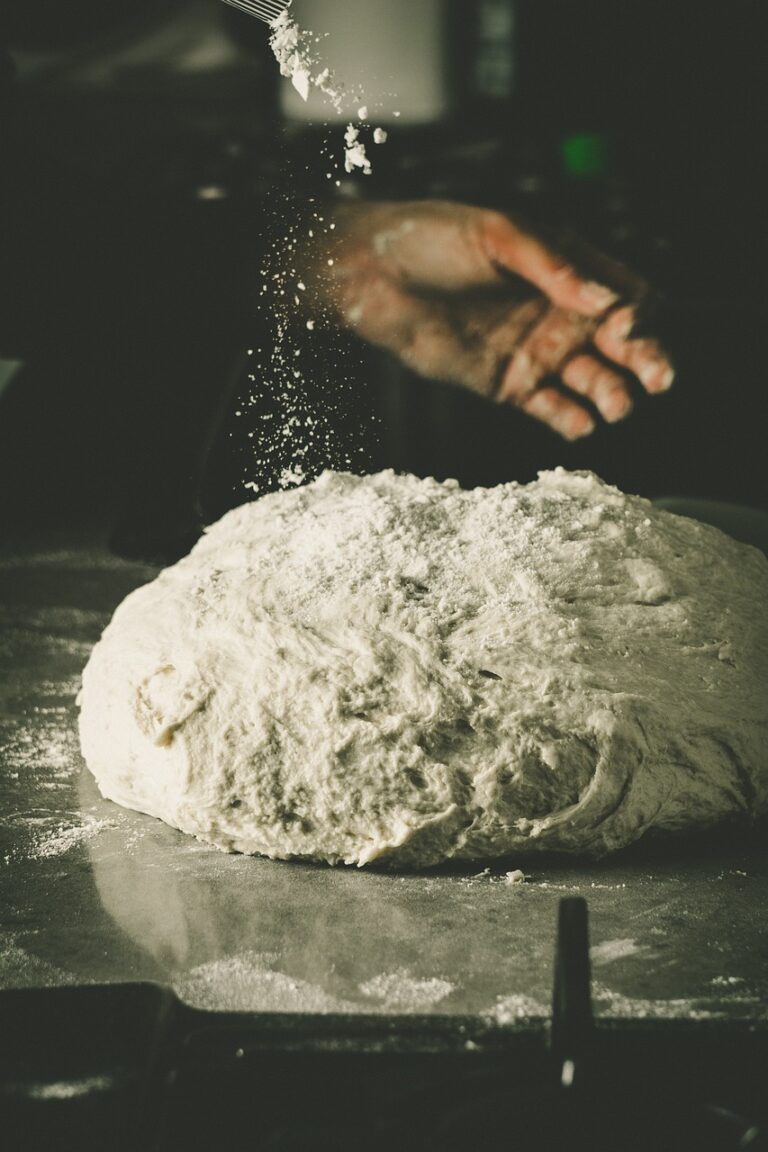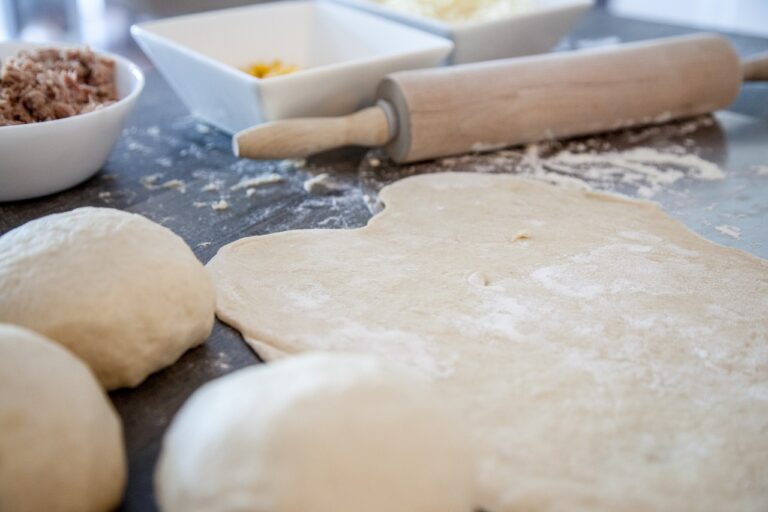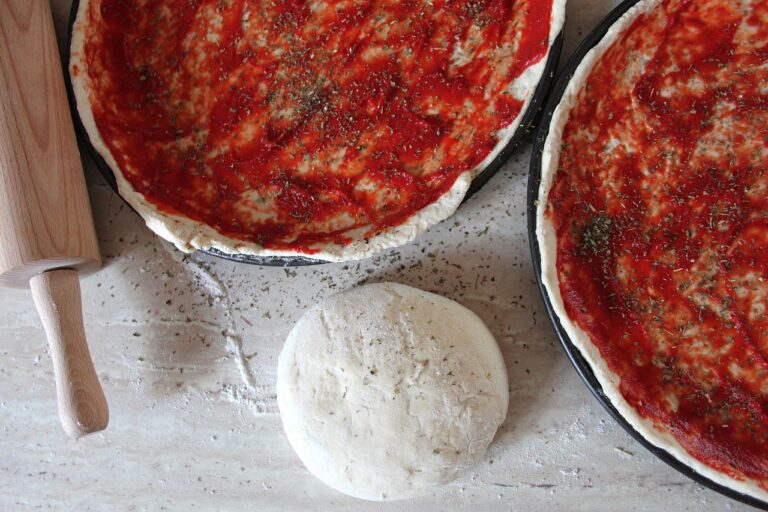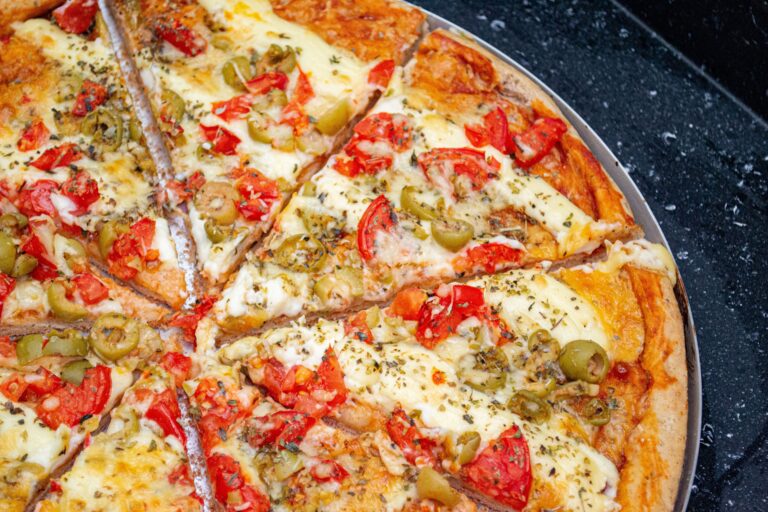Low-Carb Pizza Crust Recipe
Are you looking for a delicious alternative to traditional pizza crust? Look no further! In this article, we’ll show you how to make a low-carb pizza crust that is both satisfying and flavorful. Simple ingredients and easy-to-follow instructions allow you to enjoy your favourite pizza without guilt.
Whether you’re following a low-carb diet or want to try something new, this recipe will surely impress. So grab your apron, and let’s get cooking!
Ingredients for Low-Carb Pizza Crust
To make the low-carb pizza crust, you’ll need almond flour, eggs, and grated parmesan cheese. These ingredients are delicious, provide numerous nutritional benefits, and are a great alternative to traditional high-carb pizza crusts.
Almond flour is the star ingredient in this recipe. It is made from finely ground almonds and is naturally low in carbohydrates and high in healthy fats and protein. Almond flour offers a subtle nutty flavour that pairs well with various toppings and provides a satisfying texture to your low-carb pizza crust.
Eggs act as a binder in the crust, holding everything together while adding essential nutrients like protein and vitamins. They also contribute to the overall structure of the crust, giving it a light and airy texture.
Grated parmesan cheese adds another layer of flavour to your low-carb pizza crust. It enhances the taste profile and contributes calcium and essential minerals to your diet.
Step-by-Step Instructions for Low-Carb Pizza Crust
Mix the almond flour, eggs, and melted butter in a bowl. This simple step is the foundation of your low-carb pizza crust. Once you have combined these ingredients, spread the mixture evenly onto a baking sheet lined with parchment paper. Bake it in a preheated oven at 350°F for 15-20 minutes or until golden brown.
Now that your crispy and delicious low-carb pizza crust is ready, it’s time to get creative with toppings. Here are four innovative and mouthwatering options to consider:
Pesto Chicken: Spread homemade pesto sauce on your crust and top it with grilled chicken, cherry tomatoes, and mozzarella cheese. The combination of flavours will leave you craving more.
Margherita Zucchini: For the base topping, replace traditional tomato sauce with thinly sliced zucchini. Add fresh basil leaves and buffalo mozzarella for that classic margarita taste.
BBQ Pulled Pork: Slather your crust with sugar-free barbecue sauce, then pile on tender pulled pork, red onions, and cheddar cheese. This tangy and savoury combination will satisfy all your comfort food cravings.
-
Greek Veggie Delight: Use tzatziki as the sauce for your low-carb pizza crust alternative. Top it off with feta cheese, olives, diced cucumbers, cherry tomatoes, red onion slices, and a sprinkle of oregano for a refreshing Mediterranean twist.
These low-carb pizza crust alternatives paired with innovative toppings will make every bite guilt-free while keeping your carb intake in check!
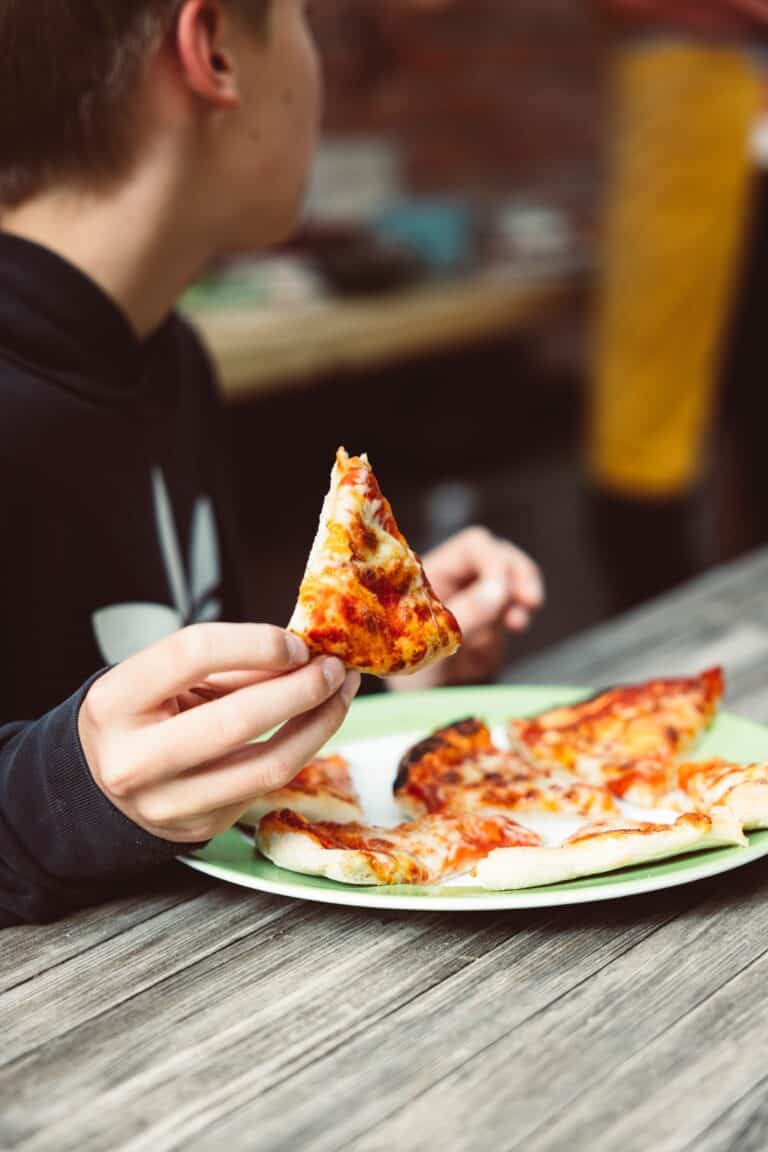
Tips for Making the Perfect Low-Carb Pizza Crust
Are you looking to make the perfect low-carb pizza crust? This discussion will explore critical points that will help you achieve that. First, we’ll delve into the best low-carb flour to use as a base for your crust, providing you with delicious and carb-friendly options. Next, we’ll discuss alternative pizza crusts for those experimenting with different flavours and textures.
Best Low-Carb Flours
Almond flour is among the best low-carb flour in a pizza crust recipe. It has a mild, nutty flavour, complements the toppings well and provides several nutritional benefits. Here are four other low-carb flour substitutes you can try:
Coconut Flour: Made from dried coconut meat, it adds a subtle sweetness to the crust and is high in fibre.
-
Flaxseed Meal: Ground flaxseeds work well as a binder in pizza crusts and are rich in omega-3 fatty acids.
-
Cauliflower Rice: This vegetable-based option is low in carbs and gives the crust a unique texture and taste.
Psyllium Husk Powder: Psyllium husk powder is a binding agent that helps create a firm and chewy crust while providing extra fiber.
Incorporating these low-carb flours into your pizza crust recipe will reduce your carb intake and allow you to enjoy their various health benefits, like improved digestion and satiety.
Get creative with your low-carb pizzas while staying on track with your dietary goals!
Alternative Pizza Crusts
Try experimenting with different types of crust alternatives to create a unique and satisfying pizza experience. Plenty of delicious choices are available, whether you’re looking for low-carb or gluten-free pizza.
One popular option is cauliflower crust, which is made by blending cauliflower florets into a fine texture and mixing it with eggs and cheese. This crust is low in carbs and provides a good source of vitamins and minerals.
Another alternative is using zucchini slices as the base for your pizza. Slice the zucchini lengthwise, brush with olive oil, and top with your favourite toppings. The zucchini adds a refreshing crunch while keeping the carb count down.
For a grain-free option, try using almond flour or coconut flour as the main ingredient for your crust. These flours are naturally gluten-free and provide a nutty flavour that complements various toppings.
So go ahead and get creative with your pizza crusts – there’s no limit to the possibilities!
Baking Temperature and Time
The baking temperature and time are crucial factors in achieving a perfectly crispy golden crust for your low-carb pizza. Here are some baking temperature tips to consider to ensure the best results.
Firstly, preheat your oven to a higher temperature, such as 425°F (220°C), to create that desired crispiness. This high heat will help bake the crust quickly while giving it a beautiful golden colour.
Secondly, adjusting the cooking time is equally important. Keep an eye on your pizza during baking, and remove it from the oven when the edges turn golden brown and slightly crispy. This may take about 12-15 minutes, but every range differs, so be attentive!
Baking and Cooking Time for Low-Carb Pizza Crust
Once you have prepared the low-carb pizza crust, it will only take about 15 minutes to bake in the oven. This quick baking time is one of the many advantages of using a low-carb crust for your pizza. Not only does it save you time, but it also allows you to enjoy a delicious and healthier alternative to traditional pizza crust.
A few tips can help ensure the best results when baking your low-carb pizza crust. First, preheat your oven to 425°F (220°C) to ensure the crust bakes evenly and crispy. Next, place your prepared crust on a baking sheet or pizza stone lined with parchment paper or lightly greased with cooking spray.
Here is a helpful table summarizing the cooking time for various types of low-carb pizza crusts:
| Type of Crust | Baking Time |
|---|---|
| Cauliflower | 12-15 minutes |
| Zucchini | 10-12 minutes |
| Almond Flour | 10-12 minutes |
| Coconut Flour | 8-10 minutes |
| Eggplant | 12-15 minutes |
Remember that these times are approximate and may vary depending on the thickness of your crust and individual oven temperatures. It’s always a good idea to keep an eye on your pizza while it bakes to avoid burning.
With these baking tips and crust alternatives in mind, you can easily create a low-carb pizza that satisfies your cravings without compromising taste or healthiness. Enjoy experimenting with different flavours and toppings to make every bite innovative and enjoyable!
Variations and Toppings for Low-Carb Pizza Crust
Are you looking to amp up your low-carb pizza game? We’ll explore creative topping ideas that will take your low-carb pizza crust to the next level. Plus, we’ll uncover flavorful crust options that satisfy your cravings without derailing your healthy eating plan. So get ready to indulge in a guilt-free pizza experience like never before!
Creative Topping Ideas
Try experimenting with different topping combinations to add a unique twist to your low-carb pizza crust. Get creative and think outside the box to create delicious, innovative flavour combinations that impress your taste buds.
How about trying a combination of sliced pear, blue cheese, and arugula for a sweet and savoury experience? Or perhaps you could try topping your low-carb crust with smoked salmon, cream cheese, and dill for a refreshing and light option.
If you’re feeling adventurous, why not experiment with roasted butternut squash, caramelized onions, and goat cheese for a burst of autumn flavours? The possibilities are endless for creating unique flavour combinations on your low-carb pizza crust. Have fun exploring different ingredients, and let your imagination run wild!
Best Low-Carb Variations
Now that you’ve explored some creative topping ideas for your low-carb pizza, let’s discuss the best low-carb variations in cheese and sauce.
When choosing the right cheese, select options low in carbohydrates but still packing a flavorful punch. Mozzarella and cheddar are excellent choices as they contain minimal carbohydrates while providing that gooey goodness we all love. You can also try goat cheese or feta for a tangy twist.
As for the sauce, traditional tomato-based spices tend to have more carbs due to their natural sugar content. However, you can easily swap them out with alternatives such as homemade pesto or Alfredo sauce made with cream and Parmesan cheese. These options are lower in carbs and add unique flavours to your pizza.
Flavorful Crust Options
If you’re craving a flavorful twist, try experimenting with different herbs and spices in your homemade crust. This will add an exciting flavour to your pizza and allow you to customize the taste according to your preferences. Some popular options include garlic powder, oregano, basil, thyme, and even chilli flakes for those who enjoy a little heat. These herbs and spices can enhance the overall taste of your low-carb pizza crust while keeping it healthy and delicious.
Once you have perfected your flavorful crust, it’s time to think about the toppings and sauce. For a low-carb option, consider using tomato or marinara sauces made explicitly with reduced sugar or no added sugars. These sauces are often packed with flavour without the excess carbs. As for toppings, get creative! Opt for fresh vegetables like spinach, mushrooms, bell peppers, or grilled chicken or shrimp. These choices provide additional nutrients and add interesting textures and flavours to your low-carb pizza creation.
Innovating in the kitchen doesn’t mean sacrificing taste or healthiness. By experimenting with different herbs and spices in your homemade crust and choosing flavorful toppings and low-carb sauce options, such as reduced-sugar tomato or marinara sauces, you can create a unique and satisfying pizza experience that fits into your low-carb lifestyle.
So go ahead – let your culinary creativity run wild!
Serving Suggestions for Low-Carb Pizza Crust
Try topping your low-carb pizza crust with fresh arugula and cherry tomatoes for a delicious twist. This combination adds freshness and tanginess to your pizza while keeping it low in carbs.
But don’t stop there! There are plenty of other innovative ways to serve your low-carb pizza crust that will satisfy your cravings and keep you on track with your healthy eating goals.
Here are three exciting serving suggestions for your low-carb pizza crust:
Low-Carb Pizza Sauce: Opt for a low-carb alternative instead of traditional tomato sauce. Look for sauces that have minimal added sugars and are made from high-quality ingredients like crushed tomatoes, garlic, herbs, and spices. These sauces will add flavour without the extra carbs.
Low-Carb Cheese Options: While cheese is a staple topping for pizza, it can be high in fat and calories. Luckily, many low-carb cheese options are available that still provide great taste without guilt. Opt for cheeses like mozzarella or feta, which are lower in carbohydrates than cheddar or Swiss.
Creative Veggie Toppings: Think
beyond the usual pepperoni or mushrooms when it comes to toppings. Get creative by adding thinly sliced zucchini or bell peppers for extra crunch and nutrition. You can also experiment with herbs like basil or oregano to enhance the flavoursfurther.
